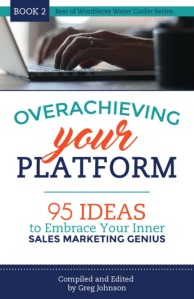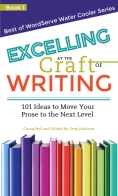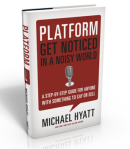Yes, it’s true. You have to build your platform to catch the eye of a publisher. And, yes, most of us agree it can be a pain in the patootee, when what we really want to be doing is writing.
Here’s the one thing I know about effective platform-building:
When purposing to build a platform, do what works for you.
You’ll be most successful if you invest your energies in a way that’s live-giving for you.
Your platform-building efforts should align with who you are.
Pay attention to how you’re wired and situated…
- Are you an introvert or extrovert?
- Do you enjoy speaking or dread it?
- Are you free to travel or chained to your home?
- Do you have the freedom to post on your blog every day, or once a week?
To the extent that you’ll be driving this bus, building platform is about you. But to the extent that you’re inviting others into what you’re doing, it’s not about you! Is your writing and speaking meeting the real needs of the audience you’re building? Are you creating content that has value for them? Are you building relationships and promoting the work of others?
Build your audience by creating great content that has value for them.
…but back to you!
Here’s a list of 10 possibilities—among zillions—to stimulate your imagination for building your platform. Do one or two stand out? What has your name on it? What other ideas do these trigger?
1. Old School Article Writing
Create a list of 20 publications for which you’d like to write and begin pitching! If you have friends who’ve written for these mags, get a good contact name.
2. Easy Social Media Opps
The hard part was getting the gig and writing the thoughtful article for the online publication. The easy part will be posting the link on facebook and Twitter. Remember to capitalize on all that work you put into crafting the article. Tweet it 3 or 4 times over several weeks.
3. Go Live on Facebook
Got something to say? Start communicating with your audience. (Yeah…this isn’t for everyone.)
4. Ask For Help
Extend a personal invitation to friends to share something you’ve written. Don’t be all mass-email about. Ask personally.
5. Speak Locally
Volunteer to speak to your local MOPs group, or other gathering that regularly invites speakers. (The venues that don’t pay–like MOPs and many churches–are a great place to build your speaking resume!)
6. Engage Online Communities
Comment on good content you’re reading. Promote the work of others in your field (and make virtual friends!) by sharing valuable links…comment on relevant articles…become strategically involved!
7. Email Signature Line
Make every email count by linking to your site, blog or product at bottom.
8. Make Friends (aka “networking”)
When I read something I enjoy, I often do a quick search online for the writer’s email to send a note about why I liked their work & “friend” them as well. (Note: these are sincere.)
9. Piggyback
If I know I’ll be speaking someplace, I might get in touch with a local church or friend or school that might also need a speaker. (And save $ on travel, too!) Also fair game to have an assistant—or a friend who will do this for you!—make these contacts.
10. Vlogging
When I was blogging, I had a quickie question that I’d ask folks, and they’d answer for about 1 minute while I filmed with my pocket-size flipcam. These got posted to social media and each one meant one more happy day I didn’t have to write a blog post.
These are jumping-off points. What feels life-giving? What feels death-dealing?
Remember why you’re building your platform.
You are building your platform for the privilege of continuing to be able to communicate with audiences.
That big-picture view is what keeps me tweeting. (Rarely…don’t count them.)
Remember, you don’t have to do everything. Just the next thing.
RESOURCES…
2 must-see resources if you’re a writer who’s serious about building platform…
- Michael Hyatt’s book, aptly named Platform.
- Rachelle Gardner’s fabulous blog for writers!
This post first appeared on Margot’s blog, wordmelon.com.













